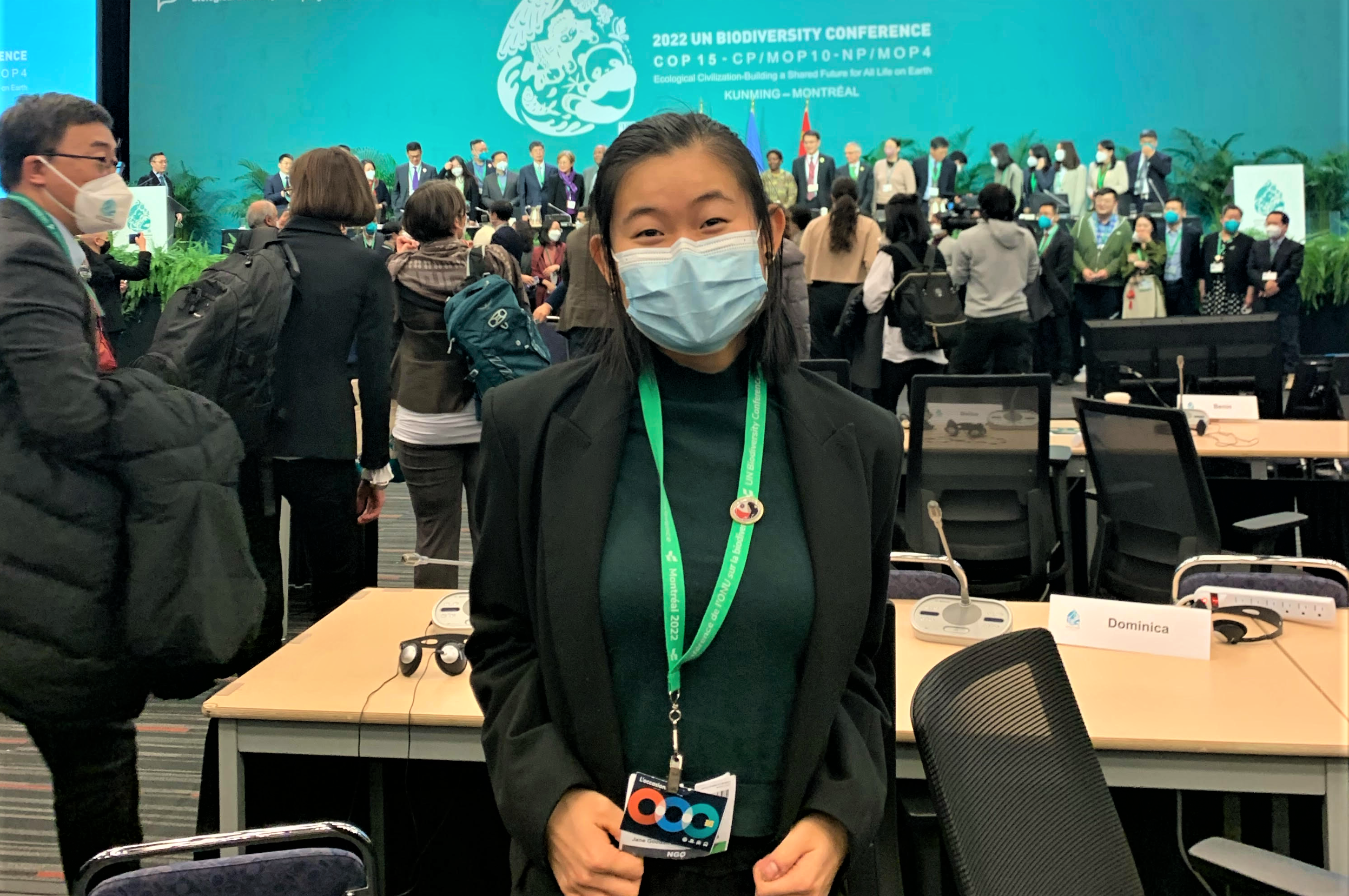By Jessica Scott-Reid
Jessica is a Canadian writer, animal advocate and plant-based food expert. Her work appears regularly in media across Canada and the US.
While the lasting significance of the agreements to come out of the United Nation’s recent biodiversity summit, COP15 held in Montreal, is still subject to debate, one group of delegates is leaving the event certain of at least one thing: there is hope. Members of the The Jane Goodall Institute Canada's (JGIC) Youth Advisory Council (YAC) attended the summit to offer crucial youth perspectives, as well as learn how to best collaborate in the fight against biodiversity loss and climate change—issues that will impact their generation more than any other.
JGIC’s Youth Advisory Council delegates at the Biodiversity Summit COP15: l to r, Michael Lechinno, Cassandra Carlson and Chloe Chang
JGIC’s YAC includes a diverse group of 12 members aged 18-25 from across Canada, who serve a two-year term. The Council was created in 2020 “to have more of a youth voice within the organization,” explains Lauren Saville, manager of JGIC’s 30-plus year-old Roots and Shoots youth leadership program. Saville says including youth perspectives in discussions and decisions around climate action, especially at meetings like COP, is essential as they will be the ones left with the fallout of those decisions, and they will be the ones in leadership roles when that happens. “Their voices need to be heard,” she adds.
“It’s about the people, it’s about individuals making a difference … there are people who care”
— Chloe Chang
One YAC member who attended the summit, Chloe Chang, is a science student at the University of Guelph in Ontario, studying wildlife biology and conservation. She explains that working on climate change and biodiversity loss is not just a personal passion for her, but something she is doing “because I feel like I have to. And I know so many other youth feel this way,” she adds, citing issues such as eco-stress and climate anxiety.
On the JaneGoodall.ca site, YAC members write about how Generation Z also come from a valuable viewpoint unique only to them. “With our generation maturing alongside this era’s digital bloom, we’ve cultivated unrivaled digital literacy and access to information,” the members write. “We were also the first children to have grown up watching international climate and biodiversity conferences; we have seen and lived through the successes of their triumphs and the impacts of their failures. We care about implementing solutions for tomorrow’s future because we know that we have the most at stake.”
Personally, notes Chang, “I am a well-informed human being, and I have innovative solutions because I am young. My brain is working 365 to try to make the world feel like a little less of a crappy place.” One of those solutions, she says, is collaborating with Indigenous groups, something she's been able to do thanks to her involvement on the Council. “I have met so many elders and gotten so many diverse perspectives from Indigenous youth.” She believes that merging the minds of youth and Indigenous peoples is crucial to fighting climate change and biodiversity loss “because we are both the biggest stakeholders, but also the biggest solution holders.”
Chloe after the 1:00 am meeting on December 20th, when the Global Biodiversity Framework was finally enacted.
While agreed-upon frameworks to come out of COP15 have resulted in some disappointments (Chang points to a lack of attention paid to harmful animal agricultural systems, as an example), the event also produced cautious optimism. “As Jane Goodall always says, it is about hope, it’s about the people, it’s about individuals making a difference,” says Chang, “and my takeaway from COP15 is that there are people who care,” she says, “there are good intentions."
However, putting those intentions into action is where Chang sees the greatest challenge. “What’s difficult is the implementation of top-down frameworks to work with solutions that come from the bottom, and I think that’s where there is a disconnect.” Those solutions, she reiterates, include involving youth, especially in non-youth spaces such as COP15. “Because we won’t let this keep happening.”
“If you want to protect the world’s biodiversity, then you need to include the world’s youth," the YAC members write. "We are an invaluable, and untapped resource in the work of protecting our planet.”




